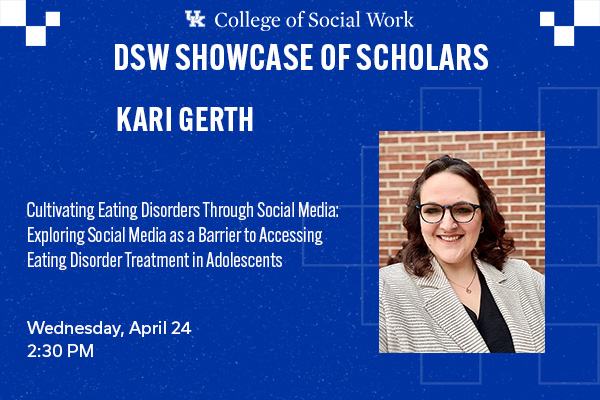DSW Candidate – Kari Gerth, MSW, LCSW, 2:30 PM – 3:45 PM
$0.00
Virtual Showcase of DSW Scholars 2024 Event!
Cultivating Eating Disorders Through Social Media: Exploring Social Media as a Barrier to Accessing Eating Disorder Treatment in Adolescents
DSW Candidate – Kari Gerth, MSW, LCSW
Wednesday, April 24, 2024
2:30 PM – 3:45 PM Eastern Time Zone
Credit Hours: 1.0
Description
Cultivating Eating Disorders Through Social Media: Exploring Social Media as a Barrier to Accessing Eating Disorder Treatment in Adolescents
Eating disorders are a devastating mental illness with the second highest mortality rate among mental illnesses, behind opioid use (Thompson & Park, 2016). Eating disorders tend to develop in the early adolescent years and have both psychological and physical implications (Ali et al., 2020). Despite the evidence-based practices that are beneficial in the treatment of eating disorders, over 75% of those diagnosed with an eating disorder fail to seek treatment. This is due to various barriers (Tillman et al., 2012), such as cultural stigma, access to care, and financial limitations (Ali et al., 2020; Thompson & Park, 2016).
Cultivation and objectification theories have been used as frameworks to explore and understand these barriers and why treatment is so low. Media and social media were inundated with the idealized, thin, and often edited content of women’s bodies, which frequently consisted of looks that were nearly impossible to achieve. Numerous studies found a correlation between the development of eating disorder symptoms and social media content (Hesse-Biber et al., 2006).
Gaps in treatment and understanding of the development of eating disorders have existed for a long time. Being able to understand barriers to seeking treatment and the role social media has on the development of eating disorders can help minimize this disparity in accessing care and treatment. It is essential to explore how reducing barriers by increasing access to care, reducing cultural stigma, and increasing funding can positively impact eating disorder treatment.
Learning Objectives:
- Understand the gravity of eating disorders as a mental illness by examining their prevalence, mortality rates, and onset during adolescence.
- Explore the various barriers to seeking treatment for eating disorders, including cultural stigma, limited access to care, and financial constraints.
- Understand the role of media, and social media has in perpetuating unrealistic body ideals and its correlation with the development of eating disorder symptoms.
- Explore interventions for reducing barriers to treatment, such as increasing access to care, reducing cultural stigma, and allocating more funding for eating disorder treatment and research.
Delivery Method: Live Interactive Training via Zoom Video Conferencing
Credit Hours: 1.0 (ACE)
Target Audience: This conference is intended for social workers and students.
Accreditation: University of Kentucky College of Social Work, Provider # 1377, is approved as an ACE provider to offer social work continuing education by the Association of Social Work Boards (ASWB) Approved Continuing Education (ACE) program. Regulatory boards are the final authority on courses accepted for continuing education credit. ACE provider approval period: 9/29/22-9/29/25. Social workers participating in this conference will receive up to 15 general continuing education credits.
Claiming CE Credit: Instructions for claiming CE credit will be disseminated at the beginning of each session.
Questions: If you have any questions regarding CE credit or to report a grievance, please contact Melissa Whitaker at melissa.whitaker@uky.edu. For technical assistance, please contact lmshelp@uky.edu.
